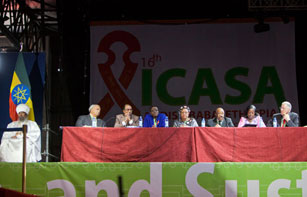
From left to right: President of the World Council of Churches, Abune Paulos I. Ambassador Eric Goosby, United States Global AIDS Coordinator, UNAIDS Executive Director Michel Sidibé, African Union Social Affairs Commissioner Ms Bience Gawanas, Minister of Health of Mali, Ms Madeleine Ba Diallo, former president of Botswana, Mr Festus Gontebanye Mogae, Minister of Health of Algeria, Mr Oueld Zbel Yastahel Kadad, and the Minister of Health of Rwanda, Dr Agnes Binagwaho. 5 December, 2011.
Credit: UNAIDS/J. Ose.
African leaders met on Monday 5 December at a special roundtable session during the International Conference of AIDS and STIs in Africa (ICASA 2011) to take stock of the efforts and promises made towards the AIDS response, the challenges and the way forward to fulfill these commitments.
Participants at the roundtable session were UNAIDS Executive Director Michel Sidibé, former president of Botswana, Mr Festus Gontebanye Mogae, Ambassador Eric Goosby, United States Global AIDS Coordinator, Minister of Health of Algeria, Mr Oueld Zbel Yastahel Kadad, Minister of Health of Rwanda, Dr Agnes Binagwaho, Minister of Health of Mali, Ms Madeleine Ba Diallo, African Union Social Affairs Commissioner Ms Bience Gawanas and the President of the World Council of Churches, Abune Paulos I.
Initial discussions evolved around the role of African leaders in the HIV response and the efforts devoted to mobilize resources locally. In his opening remarks, Mr Sidibé called upon African leaders to find ways to sustain and scale up progress made in the region while trying to be more independent from external resources. “If we don’t have political leadership the transformation of the AIDS response in the region will not happen,” said Mr Sidibé.
Participants articulated the efforts and promises made toward the AIDS response, in particular with respect to the Millennium Development Goals and the Abuja and Maputo declarations. “We have created a political platform but we must keep AIDS high in the political agenda,” said Ms Gawanes. “Now is the time when these declarations need to be translated into better life for people,” she added.
If we don’t have political leadership the transformation of the AIDS response in the region will not happen
UNAIDS Executive Director Michel Sidibé
Ambassador Goosby reiterated the commitment from the United States towards an HIV-free generation as well as his government’s decision to scale up efforts to put more people on HIV treatment.
The speakers highlighted the progress made in the AIDS response, both in Africa and globally, but were quick to stress that challenges still exist and continue to arise. All participants agreed that if HIV prevention programmes are to be fully implemented communities must be engaged and adequately funded.




